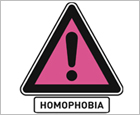In 1990, the World Health Assembly approved the 10th Edition of the International Classification of Diseases (World Health Organization) on May 17, which established that sexual orientation (heterosexual, bisexual or homosexual), on its own, would no longer “be considered as a disorder”. For this reason May 17 is used to mark the International Day against Homophobia.
Of the 192 member states of the United Nations, 85 have laws that criminalize homosexual behaviour. In some of these countries, conviction can result in the death penalty.
The criminalization of homosexuality fuels discrimination and can force people to hide their sexuality for fear of prosecution. Where people cannot live openly with their sexual orientation, the risk of HIV infection and the impact of AIDS are greatly enhanced as people may be too afraid to access HIV prevention or treatment services. This is compounded where human rights violations on the basis of sexual orientation and gender identity are widespread. These violations include violence, vilification, arbitrary arrests, forced HIV tests, and discrimination.
In many cases—particularly where political or social leaders deny the existence of same sex sexuality or criminalize it—HIV services tailored to their needs are absent altogether from national responses to AIDS.
Infection rates remain disproportionately high among men who have sex with men. “To reduce HIV incidence among this group, as well as protect their human rights, we have to confront, condemn, and eradicate homophobia” said Susan Timberlake UNAIDS Senior Advisor, Human Rights and Law.
UNAIDS works with governments, civil society and the media to fight homophobia and other forms of stigma and discrimination directly and indirectly related to HIV.




